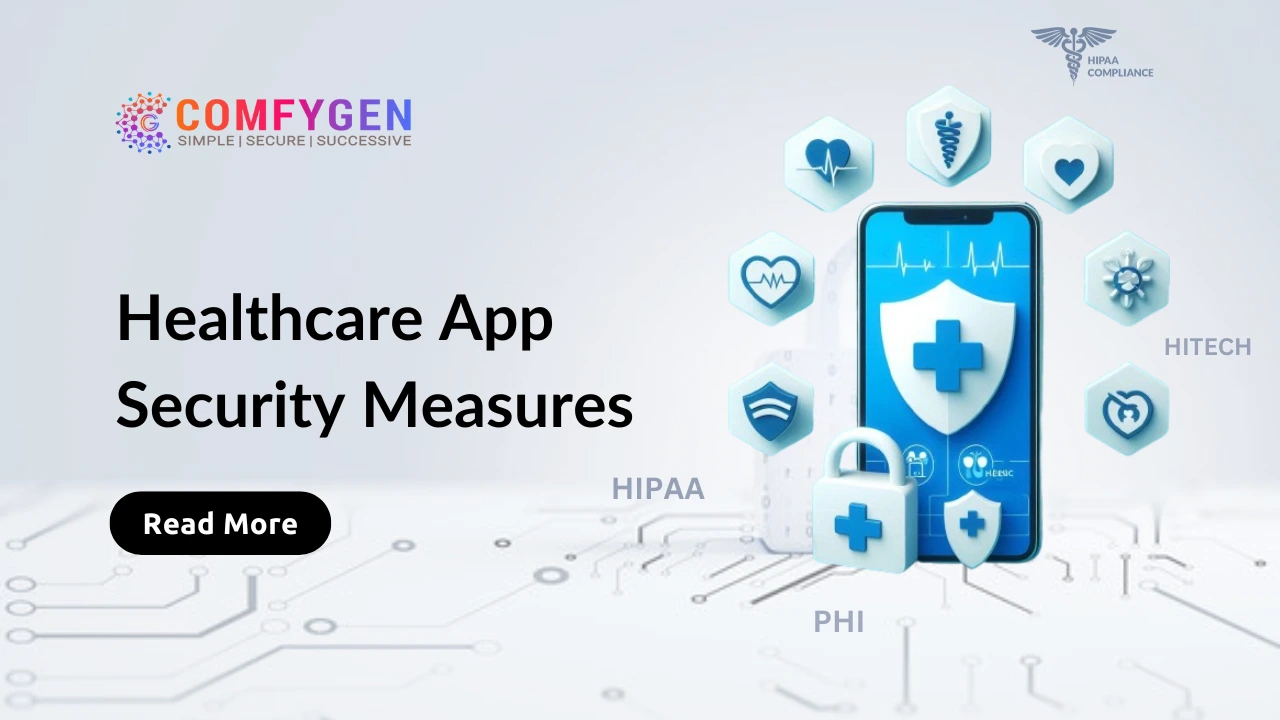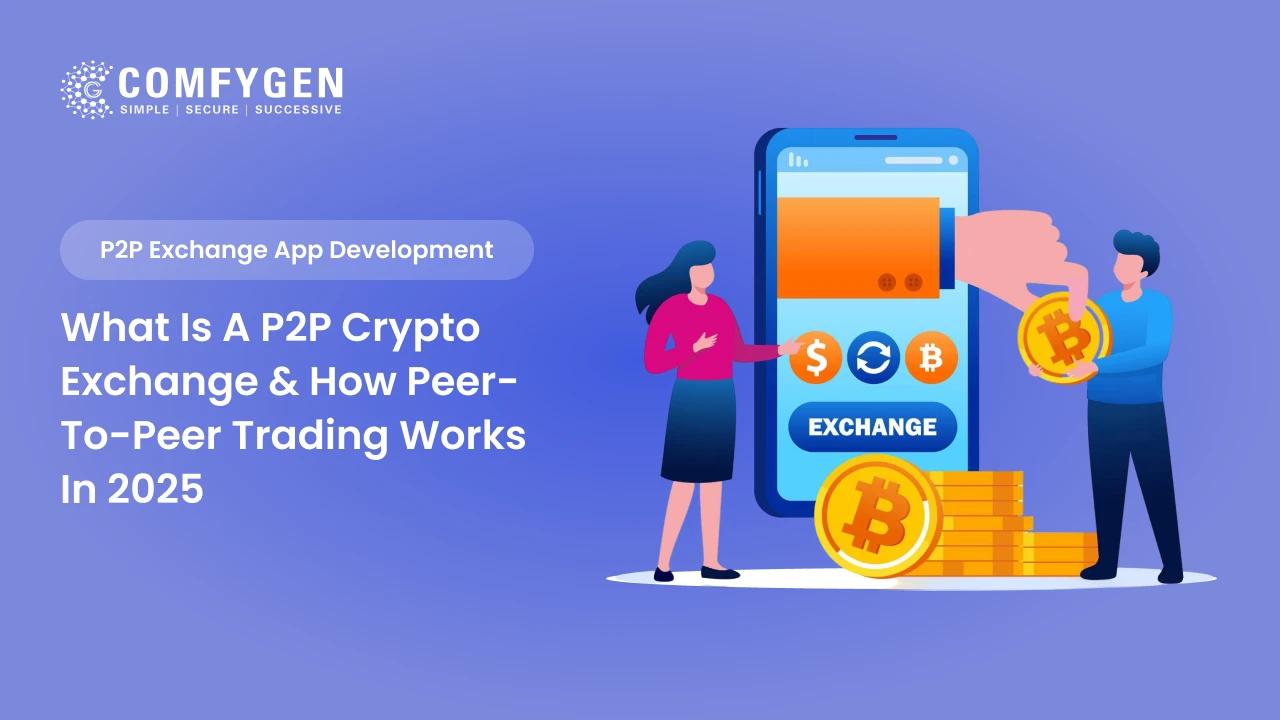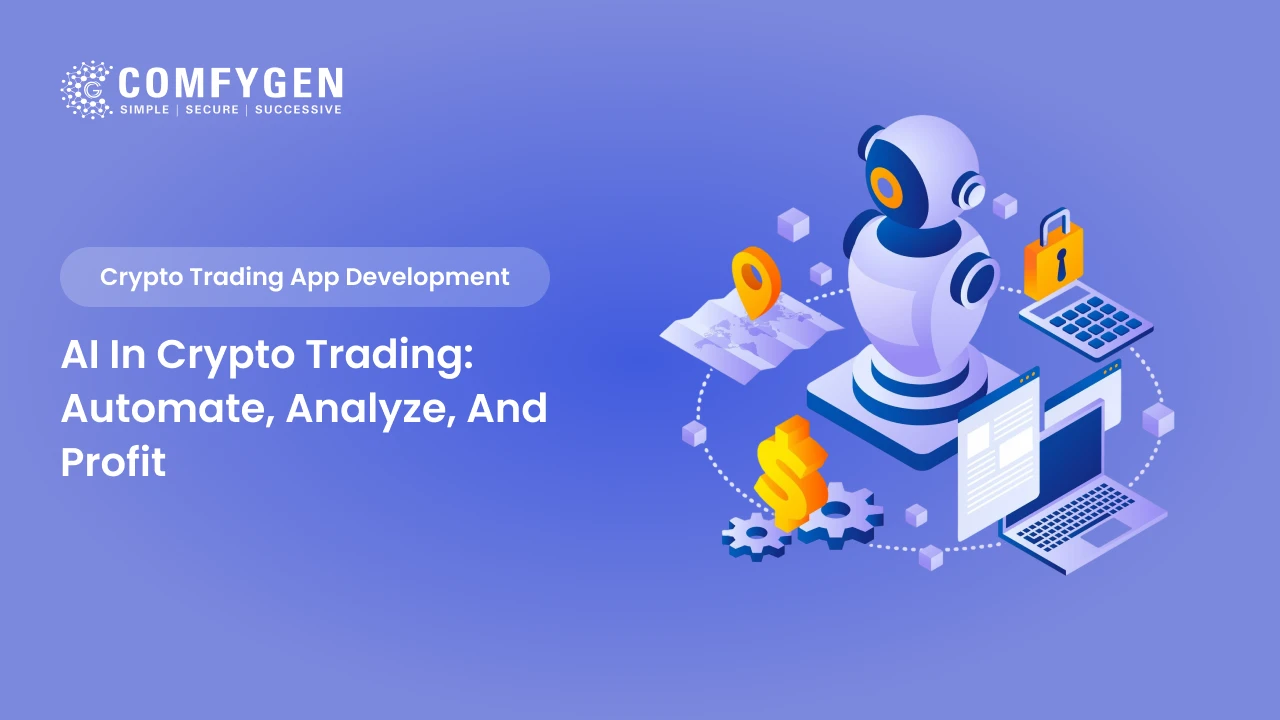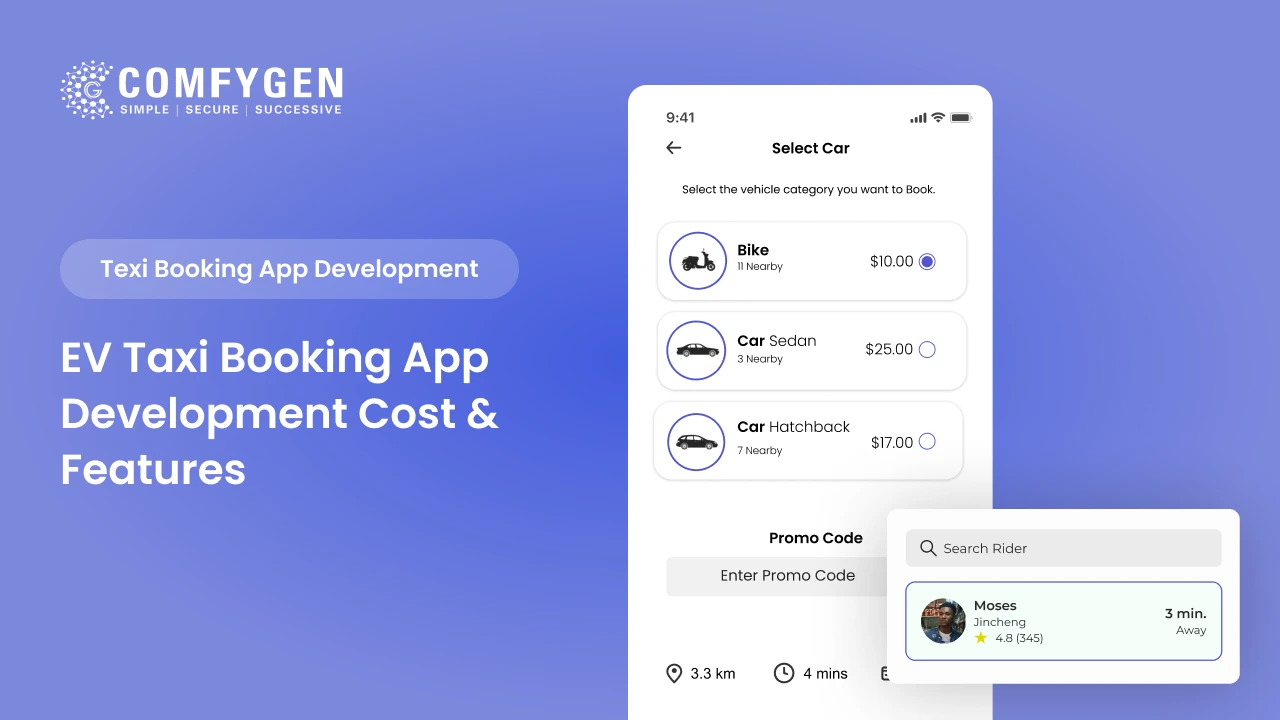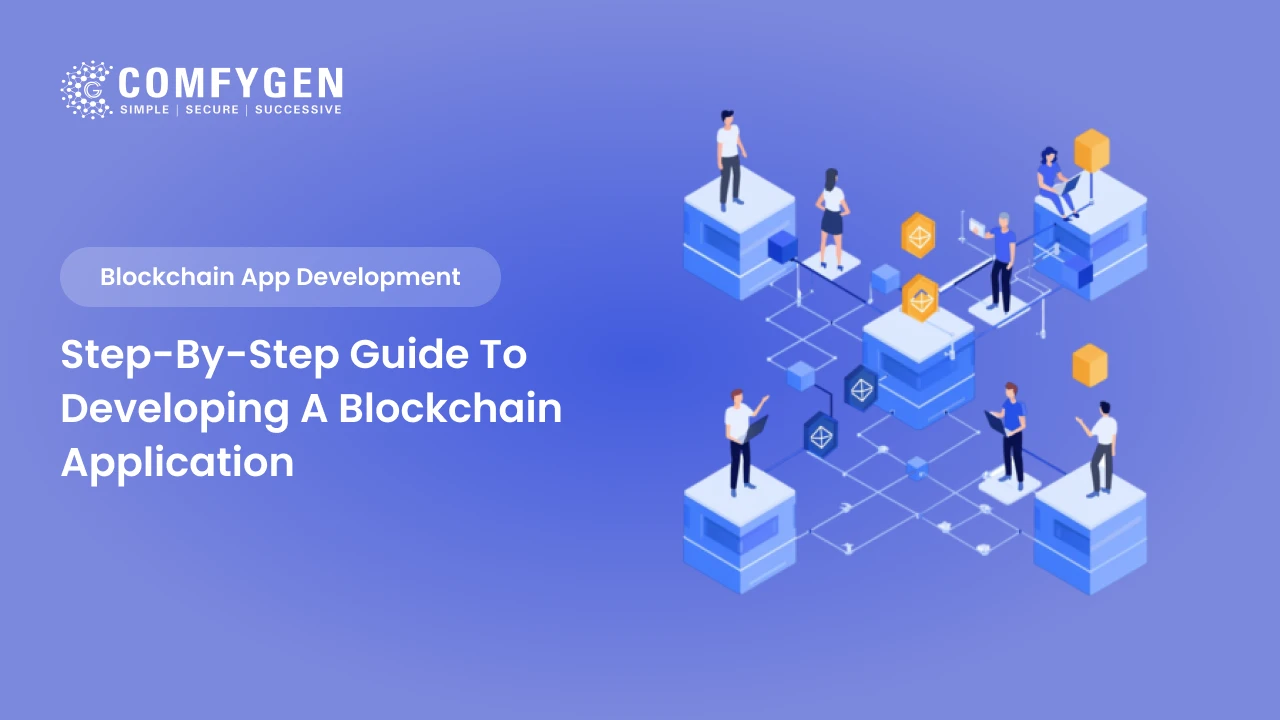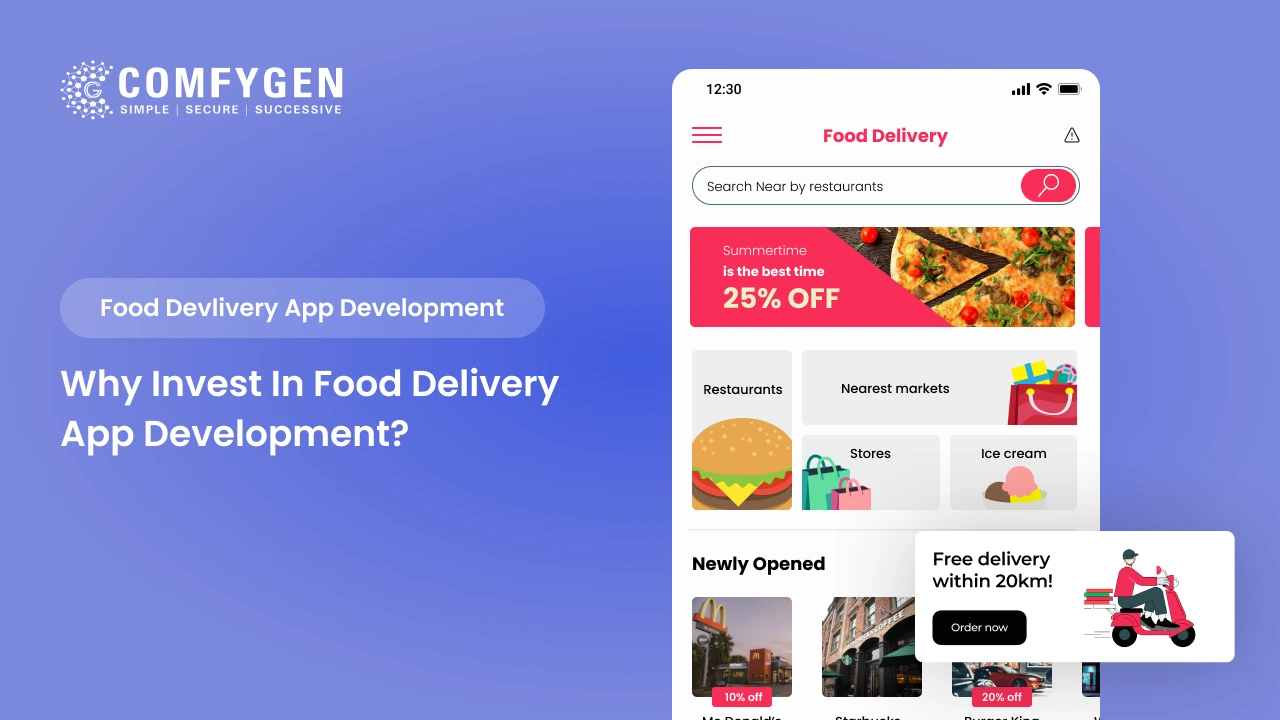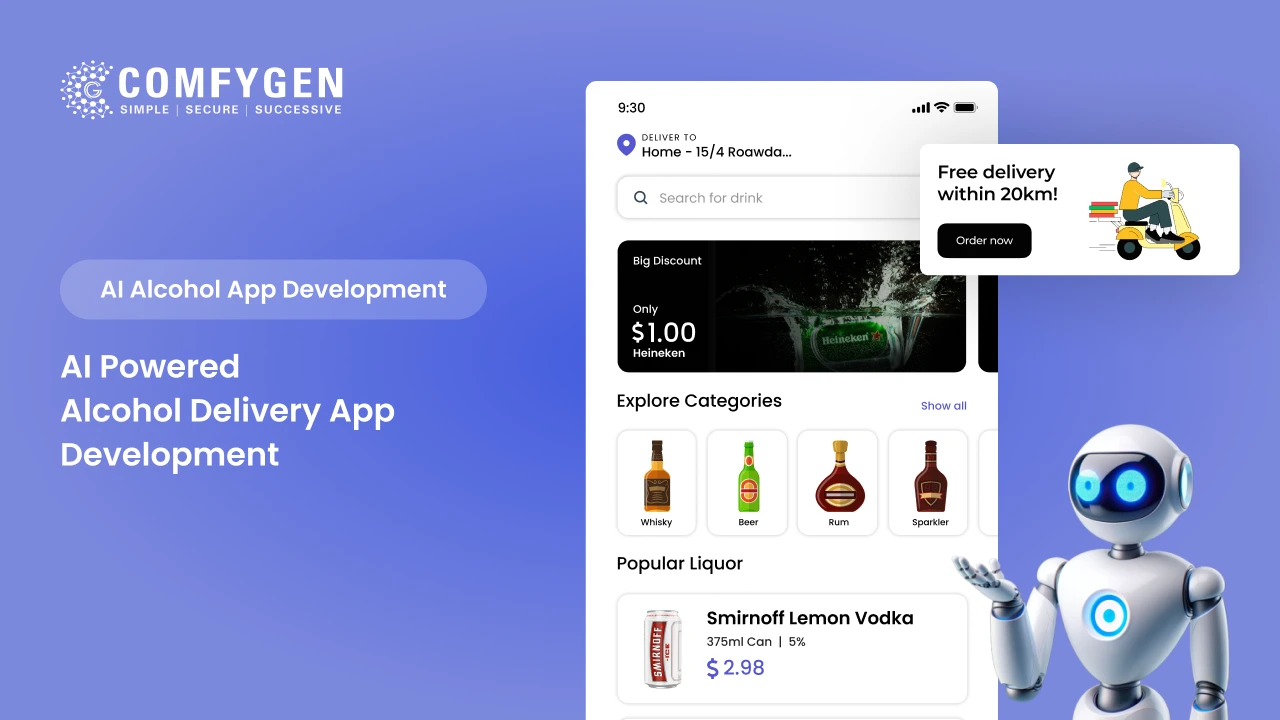Healthcare App Security Measures
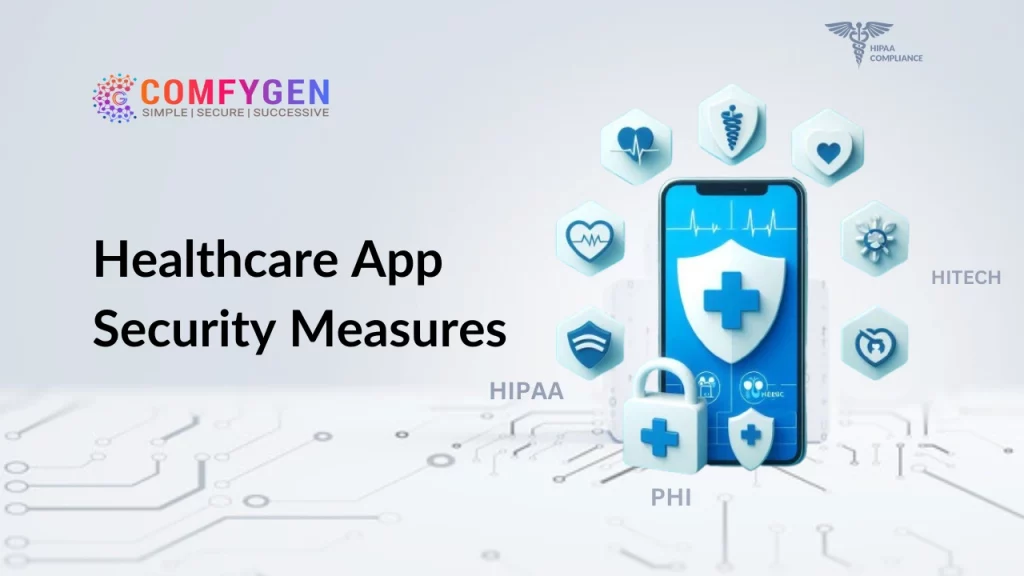
Introduction of Healthcare App Security
The rapid growth of healthcare apps has revolutionized patient care and health management. There is more activity in the healthcare Industry than ever before! Alot of people look for comfort & guidance from their doctors.
In order to diagnose a patient correctly, doctors and patients must share relevant details, past medical histories, current data. It is difficult to imagine. How all this information could be kept safe and secure.
Custom healthcare solution development is our specialty. Comfygen is a leading healthcare app development company delivering best services and solutions to all healthcare Industry problems.
“However, as these apps handle vast amounts of sensitive health data, they have become prime targets for cyberattacks. Ensuring the security of healthcare applications is essential to protect patient information, maintain trust, and comply with global regulatory frameworks.”
The purpose of this blog is to discuss the top strategies for ensuring healthcare app development adheres to security standards.
Market Statistics: The State of Healthcare App Security
Despite the growing awareness of the importance of security, many healthcare apps still lack proper security measures:
- 48% of healthcare organizations have reported data breaches in the past two years due to inadequate security.
- 30% of healthcare providers do not use data encryption or Multi-Factor Authentication (MFA).
- 60% of organizations prefer custom-developed apps for advanced security, while 25% rely on readymade solutions, and 15% use white-label apps.
These statistics highlight the urgent need for robust security measures in the healthcare app industry.
Importance of Security in Healthcare Applications
Healthcare apps deal with highly sensitive data, including patient medical histories, prescriptions, and even financial information. A breach in security could not only result in financial and legal consequences but also endanger patient health and privacy. Proper security measures are essential to protect this information from unauthorized access and ensure compliance with legal standards like HIPAA and GDPR.
Understanding Healthcare App Security
Healthcare app security is vital for safeguarding sensitive patient information against cyber threats and unauthorized access. As healthcare increasingly relies on digital solutions, robust security measures—like data encryption and secure authentication—are essential. Compliance with regulations such as HIPAA and GDPR not only protects personal health information (PHI) but also enhances trust between patients and providers. A clear understanding of these security fundamentals empowers users to make informed choices and engage safely with healthcare applications. Below you get the definition and key concepts for app security.
- Definition of Healthcare App Security – Healthcare app security refers to the practice of safeguarding mobile and web-based healthcare applications from unauthorized access, breaches, and other security threats. It involves employing security protocols to protect patient data and ensure regulatory compliance.
- Key Concepts in App Security – Key concepts in app security include data encryption, authentication mechanisms, role-based access control (RBAC), and secure software development practices.
Regulatory Frameworks and Standards
Overview of HIPAA Compliance – HIPAA (Health Insurance Portability and Accountability Act) is a U.S. law designed to protect patient information. Healthcare apps that handle patient data must comply with HIPAA’s privacy, security, and breach notification rules to ensure data confidentiality.
GDPR and Its Implications for Healthcare Apps – The General Data Protection Regulation (GDPR), applicable in the European Union, mandates that healthcare apps handling personal data must meet strict data protection and privacy standards. Non-compliance can result in heavy fines and loss of reputation.
Other Relevant Regulatory Standards – Other regulatory frameworks like HITECH (Health Information Technology for Economic and Clinical Health Act) and PCI-DSS (Payment Card Industry Data Security Standard) also impose stringent data protection standards on healthcare apps that deal with electronic health records and payment transactions.
Impact of Security Weaknesses in Healthcare Apps
Weak security in healthcare apps can have serious consequences for both providers and patients. Here are the key impacts:
- Data Breaches – Security vulnerabilities can lead to data breaches, exposing sensitive patient data like medical records and personal information, which can result in regulatory penalties under HIPAA and GDPR.
- Legal and Financial Consequences – Healthcare providers face steep fines, legal actions, and high recovery costs after a breach, with HIPAA penalties reaching up to $1.5 million per year for violations.
- Loss of Patient Trust – Data breaches erode patient trust and damage the provider’s reputation. Studies show that 70% of patients would stop using a healthcare provider or app after a breach.
- Compromised Patient Care – Security flaws can disrupt patient care, such as in ransomware attacks that block access to critical data, leading to delays in treatment or wrong medical actions.
- Increased Operational Costs – Recovering from breaches leads to increased operational costs, including system restoration, investigations, and security upgrades.
- Higher Risk of Future Attacks – Once a vulnerability is exploited, healthcare apps become more attractive targets for future cyberattacks, increasing long-term risks.
Common Healthcare App Security Risks
Custom healthcare app development professionals usually face some common risks that come up during the security layer development for custom healthcare apps. For the inclusion of updated security provisions in the healthcare app infrastructure, the healthcare app development team has to look at the risks that exist around healthcare apps in the virtual landscape.
Data Breaches
Patient data and EHR are sensitive data sets that are prone to security risks such as data breaches. The leakage of data is a cybersecurity hazard that a healthcare app development company has to look at objectively to solve. When the security layers of the healthcare app are not secure and have vulnerabilities, hackers can access the application layer and steal patient health information.
PHI is confidential and should only be available to authorized users in an ideal situation. The custom healthcare app development team has to look at ways of securing PHI with access control systems and user verification systems in place.
Unauthorized Access
One of the common and most dangerous cybersecurity issues that might exist around custom healthcare software development solutions is unauthorized access to the app. When the authorization system and patient verification system do not work properly, the risk of unauthorized access and breach of privacy are present. The unauthorized access problem can arise from the back end or the front end if the access systems do not have multiple layers and modes of verification.
Insecure Communication
Healthcare apps like telemedicine apps also integrate with telecommunication abilities over the internet. The use of telecommunication through calls and messages between the patient and doctor facilitates the exchange of sensitive information between two parties. The communication channels are crucial for the proper exchange of diagnostic and treatment information.
However, if the healthcare app security around the communication channels is not tight, then the calls and messages can go through illegal interception. The tapping of calls and messages by third parties and eavesdropping on conversations digitally is a breach of patient privacy and medical confidentiality. Therefore, it is important to make the communication portals secure during healthcare app development.
Read Also: Top Features in Healthcare Apps
Insecure Data Storage
At the time of healthcare app development, the best healthcare app development company also creates a data repository to add EHR access to the features. With the use of EHR, doctors can improve the quality of healthcare that they offer virtually. EHR integration requires a strong, flexible, and secure database that keeps all the patient health information in one place.
However, when the database is not secure and the files lack encryption, the PHI files become prone to data theft. For this, the healthcare app development company needs to take up blockchain healthcare application development so that the EHR is stored in a decentralized database, which is very difficult to breach.
Third-Party Integrations
A healthcare app development team might also integrate third-party APIs and extensions with the custom health app to add more features and abilities. The third-party integrations are an interface between external additions to the internal infrastructure of the healthcare app. It is possible that such APIs are not fully secure and create cybersecurity risks for the app user. To ensure that there are no data breaches, the healthcare app development team needs to take up HIPAA-compliant app development that secures the app product from all sides.
Drawbacks of Not Implementing Security in Healthcare Apps
- Increased Risk of Data Breaches – Without proper security measures, healthcare apps are vulnerable to data breaches, which can lead to loss of sensitive patient data.
- Potential Legal and Financial Consequences – Failure to comply with security regulations can result in legal penalties, fines, and lawsuits.
- Loss of Patient Trust and Reputation – A breach in healthcare data can cause irreparable damage to a provider’s reputation, leading to a loss of patient trust.
- Compromised Patient Care and Safety – When healthcare apps are compromised, patient care and safety can also be jeopardized as critical data may be manipulated or lost.
- Increased Operational Costs Due to Security Incidents- Security incidents often result in expensive recovery efforts, further increasing operational costs for healthcare providers.
Essential Security Measures for Healthcare Apps
In the process of custom healthcare app development, the company in the USA focuses on multiple security measures that create a very secure and safe healthcare app for the user base. Here are some basic security measures to include during the healthcare application development process.
Meeting Regulatory Compliance Standards
In every region and country, there are some industry standards and rules that govern the use of digital healthcare services. For healthcare mobile app development services, you need a custom health app development company that understands and adheres to the legal framework that governs the healthcare app development sector.
The custom health app that comes out should be compliant with national and international health industry standards. For example, the healthcare app should be compliant with the HITECH Act, which aims to improve the safety of healthcare app usage and the quality of services that people get from it.
The healthcare app development team should also take up HIPAA compliant mobile app development to meet the standards set by HIPAA. HIPAA protects the sensitive patient health records that are stored in healthcare apps. Apart from this, custom healthcare software development services should also adhere to GDPR to ensure data privacy protection for patients.
Another universal regulation that is important for healthcare apps is adherence to PCI DSS. PCI DSS maintains security firewalls around credit card information and payment information that people exchange over healthcare apps. When people make transactions to schedule a doctor appointment or to order medicines, their financial information remains under the protection of the PCI DSS rule.
Data Encryption
While the development of healthcare application software is in progress, the custom healthcare apps development team has to apply data encryption techniques. Data encryption for sensitive patient data and medical data helps secure the information through encryption keys. Encryption keys ensure that the information can only be decoded by secure checkpoints and not by malicious agents.
Data encryption is used in secure databases and telemedicine apps. Data encryption algorithms ensure that the data exchanged during calls and chats remains secure and hidden from third-party intruders. When the data goes through encryption, it becomes unreadable to other parties that do not have the exact encryption key to decode the information. For custom mHealth app development, healthcare mobile app developers use advanced data encryption methods.
Want to Build a HIPAA-compliant App?
We offer the best app development solutions to make sure your healthcare app complies with privacy standards. Contact us today!
Multi-Factor Authentication
A company offering secure services for healthcare app development in India also focuses on building code for multi-factor authentication or MFA. MFA helps create multiple security layers before the application layer so that only authenticated users can access the app information. MFA comes with personalization so that each patient can control how he or she accesses the app.
From facial to voice recognition, or biometric authentication, to the use of passwords and native security systems, multiple factors create the whole access system to add highly secure layers around the healthcare app. When the custom medical app is accessed by patients from a particular hospital, it can ask for a patient registration number. For healthcare professionals, the app login interface can include an employee identification number for unique authentication.
Authentication Protocols
Implementing strong authentication protocols like Multi-Factor Authentication (MFA) and biometric authentication helps prevent unauthorized access to the healthcare app.
Access Control Mechanisms
Using Role-Based Access Control (RBAC) and the least privilege principle limits user access to only what is necessary for their role, reducing the risk of insider threats.
Secure Development Practices
Healthcare apps must be developed using secure practices like the Secure Software Development Life Cycle (SDLC), code review, and vulnerability testing.
User Education and Awareness
Providing cybersecurity training for healthcare providers and conducting patient awareness programs are essential for minimizing security risks like phishing and insider threats.
Incident Response and Management
- Developing an Incident Response Plan – A well-developed incident response plan allows healthcare organizations to act quickly in the event of a data breach.
- Steps to Take After a Data Breach – In the event of a breach, it’s crucial to contain the incident, notify affected parties, and implement measures to prevent future occurrences.
Future Trends in Healthcare App Security
AI and Machine Learning in Security:
AI and machine learning are being used to detect patterns in user behavior, enabling more sophisticated threat detection and prevention.
Emerging Threats and Security Innovations:
As new threats emerge, healthcare apps must adapt by adopting innovations like quantum encryption and decentralized security models.
The Role of Blockchain in Healthcare Security:
Blockchain technology offers a decentralized and highly secure method for managing healthcare data, reducing the risk of tampering and ensuring transparency in data transactions.
Conclusion
In conclusion, ensuring healthcare app security is no longer optional; it is critical for protecting patient data, ensuring compliance with regulations, and maintaining trust. As the use of healthcare apps continues to grow, developers and healthcare providers must prioritize security measures to mitigate risks and safeguard patient care. A company like Comfygen uses cloud security measures, blockchain security provisions, and security testing cases to ensure that the healthcare app product is safe for launch and usage.
Healthcare app security measures evolve with time and the development of technology deployed in healthcare app development. Ensuring patient data security, medical professional profile security, and nullification of cyber threats is important for the long-term success of a custom healthcare app. Periodic security testing and penetration tests also play a major role in making a healthcare app very secure for its user base.
You want to create healthcare apps that are secure, compliant, and innovative
Contact us:
Whatsapp: +91 958-786-7258
Email: [email protected]
Telegram: @comfygen

Mr. Saddam Husen, (CTO)
Mr. Saddam Husen, CTO at Comfygen, is a renowned Blockchain expert and IT consultant with extensive experience in blockchain development, crypto wallets, DeFi, ICOs, and smart contracts. Passionate about digital transformation, he helps businesses harness blockchain technology’s potential, driving innovation and enhancing IT infrastructure for global success.
Based on Interest
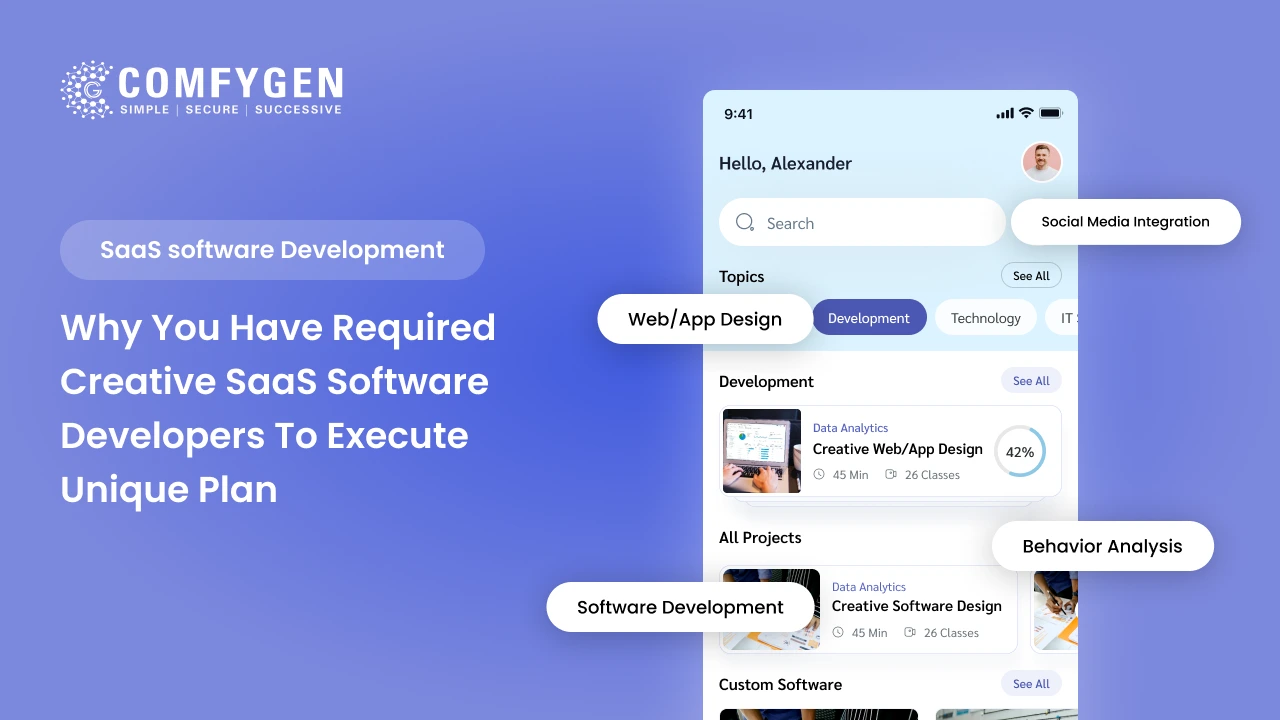
Why You Need Creative SaaS Software Developers for a Unique Project?
Businesses across industries are adapting Software-as-a-Service (SaaS) software solutions to streamline organization operations, improve customer experiences, and gain a competitive edge. However,…

